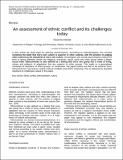| dc.description.abstract | In this article we shall begin by defining ethnocentrism. According to anthropologists, the concept combines the belief that one’s own culture is superior to other cultures, with the practice of judging other cultures by the standards of one’s own culture. Sociologists and social-psychologists extend the term to group attitudes shown by religious, economic, racial, caste and class group within a larger social order. Ethnocentrism is also defined as a feeling that one’s own group has a mode of living, values and patterns of adaptation that are superior to other groups. This leads to a generalised contempt of members of other groups. In conclusion, the paper points out that in its extreme form, ethnocentrism may lead to violent cultural conflicts and ethnic cleansing. This is followed by possible solutions to challenges raised in the paper. | en_US |

